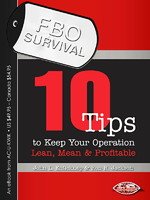FBO Tip of the Week: Keep Your FBO Operations Simple
/By John L. Enticknap and Ron R. Jackson
Aviation Business Strategies Group
No doubt many of you’ve heard of the purported business idea of KISS (Keep it Simple, Stupid). Although it’s not a phrase we like to throw around, here’s what we can glean from it for the FBO industry: Keep your FBO operations simple.
When one waxes philosophically about the FBO business, it’s sometimes easy to get caught up in some of the popular management disciplines such as business process reengineering (BPR), matrix management and consensus management, among others. Again, let’s keep it simple and boil it down to the four key things an FBO manager should really be doing:
- Plan.
- Organize.
- Control.
- Measure.
At our NATA FBO Success Seminar, we discuss these elements in detail. However, for this blog post, here’s our take on the four simple ways to manage your FBO without getting caught up in complex ideas and procedures.
1. Simple Plan
Beyond the customary detailed business plan, FBOs can keep their planning process simple by establishing short-term and long-term goals and objectives.
The short-term goals should be built around achieving expected/specified fuel or maintenance sales and determining margins and productivity rates. This would include a simple strategy and identifying the tactics required.
The long-term goals should consist of action items to be achieved over a longer period involving line items such as improving facilities, lowering insurance and credit card rates, negotiating a better fuel contract, and obtaining a longer term lease. Think in terms of writing each goal starting with an action word, such as build, promote, create, establish, lower and obtain.
2. Simple Organization
Create a simplified organization of qualified managers and supervisors. Set clear operating procedures, guidelines and, above all, communicate both your short-term and long-term goals and objectives.
Even better, get your managers and supervisors involved in the planning process. This promotes employee buy-in and raises morale.
3. Simple Control
Use data to run your business. Get and use daily reports to know what your business is doing. You can print reports or develop electronic dashboard reports from your accounting system. Industry software, like TotalFBO, has these built into their programs.
4. Simple Measure
Measuring results is critical to your planning process. Therefore, it goes full circle. Also, managers and supervisors should be informed of measurable results on a frequent basis. It becomes both an incentive and a driving factor for your business.
Perhaps the simplest way to measure results is to establish benchmarks for each of your business goals, particularly in the areas of revenue streams such as fuel and maintenance sales. You can also set a benchmark for achieving better customer service through the use of customer satisfaction surveys. (This will be discussed in a future blog.)
Remember, in measuring revenue for fuel sales, keep your margins in mind. If you sell a lot of fuel (volume) but your margins were lower than your plan, you need to adjust your findings accordingly.
The same goes for maintenance sales. Be sure to measure your productivity rate as well as your revenue (dollar volume). You may be generating more sales, but your productivity rate might be putting you in the red.
One More Tip
FBO operators who become slaves to complexity are at risk of running a reactive business and thus reactive with their time. Therefore, here’s another simple tip.
Try working “unplugged” for one hour every morning during the time set aside to plan, organize, control and measure. This means no internet/surfing connection and absolutely no phone calls, texts, etc. This will give you a sense of accomplishment that simplifies the daily routine.
About the bloggers:
John Enticknap has more than 35 years of aviation fueling and FBO services industry experience. Ron Jackson is co-founder of Aviation Business Strategies Group and president of The Jackson Group, a PR agency specializing in FBO marketing and customer service training. Visit the biography page or absggroup.com for more background.



